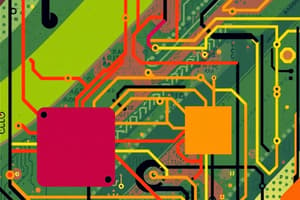Podcast
Questions and Answers
What is a major topic of study in O Level Electricity?
What is a major topic of study in O Level Electricity?
- Nuclear Physics
- Magnetism
- Thermodynamics
- DC Circuits (correct)
What type of questions may be included in O Level Electricity exams?
What type of questions may be included in O Level Electricity exams?
- Open-ended questions
- Oral questions
- Multiple-choice questions (correct)
- Essay questions
What is the primary focus of the topic of Mains Implications in O Level Electricity?
What is the primary focus of the topic of Mains Implications in O Level Electricity?
- Safety measures and precautions (correct)
- Understanding AC circuits
- Designing electrical circuits
- Calculating electrical values
What is a key skill that O Level Electricity exams may require candidates to demonstrate?
What is a key skill that O Level Electricity exams may require candidates to demonstrate?
What is the ultimate goal of studying O Level Electricity?
What is the ultimate goal of studying O Level Electricity?
What is the general objective of Electricity II?
What is the general objective of Electricity II?
What should learners be able to do with resistors in a circuit?
What should learners be able to do with resistors in a circuit?
What is the purpose of connecting a voltmeter and an ammeter in a circuit?
What is the purpose of connecting a voltmeter and an ammeter in a circuit?
What is one of the specific objectives of the sub-topic Introduction to Electricity (Part 2)?
What is one of the specific objectives of the sub-topic Introduction to Electricity (Part 2)?
What is the purpose of investigating and drawing 1V characteristics for some components in a circuit?
What is the purpose of investigating and drawing 1V characteristics for some components in a circuit?
What is the effect of connecting components in series and parallel?
What is the effect of connecting components in series and parallel?
Study Notes
O Level Electricity
O Level Electricity covers the fundamental concepts of electricity and how it flows through different components in a circuit. In this article, we'll discuss the key topics and subtopics, focusing on the O Level Electricity syllabus.
Topic: Electricity II
General Objective
The general objective of Electricity II is to help learners understand the relationship between resistance and the flow of current in different connections.
Sub-Topic: Introduction to Electricity (Part 2)
Specific Objectives
- Draw and Connect Electric Circuits: Learners should be able to create and connect various components, such as resistors, in a circuit.
- Describe the Effects of a Resistor in an Electric Circuit: They should understand how a resistor affects the flow of current and the voltage in a circuit.
- Connect a Voltmeter and an Ammeter in a Circuit Accurately: Learners should know how to connect and read the readings from these measuring instruments correctly.
- Investigate and Draw 1V Characteristics for Some Components in a Circuit: This involves studying the working of various components, like resistors and capacitors, and plotting their characteristics.
- Connect Components in Series and Parallel: Learners should be able to connect components in series and parallel circuits and understand the effects of these connections on the overall circuit.
Other Topics
Other topics in O Level Electricity include:
- DC Circuits: Understanding how current flows through a circuit and the effects of various components.
- AC Circuits: Studying the principles of Alternating Current (AC) circuits and how they differ from DC circuits.
- Mains Implications: Learning about the safety measures and precautions to be taken when working with mains electricity.
Assessment
O Level Electricity exams typically include multiple-choice questions, diagram questions, and short-answer questions. They may also require candidates to calculate values, such as resistance, in different circuits.
Conclusion
O Level Electricity is a critical subject that provides a foundation for understanding the principles of electricity. By studying topics such as electricity II, series and parallel connections, and the effects of different components, learners can develop a deep understanding of how electricity flows and works in various applications.
Studying That Suits You
Use AI to generate personalized quizzes and flashcards to suit your learning preferences.
Description
Test your understanding of O Level Electricity, covering topics such as Electricity II, circuit connections, resistors, and voltage. Learn about series and parallel connections, measuring instruments, and circuit characteristics. Prepare for your O Level exam with this quiz!




